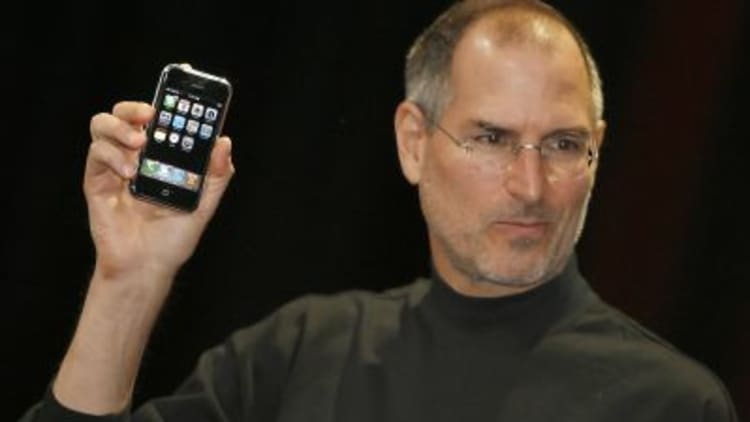Since Oct. 14, 2009 — when the Dow index first closed above 10,000 after the financial crisis — to Wednesday's 20,000 milestone, Apple has been one of the best performing tech stocks, with a gain of more than 330 percent.
Pull the timeline back longer, and Apple's performance is even more impressive: Since March 29, 1999 — the first time the Dow closed above 10,000 — the stock has skyrocketed more than 9,000 percent as the company capitalized on the historic success of the iPhone.
Apple is by far the best performer among the blue chips over that time frame, though it's important to note that the stock was not included in the index until March 2015.
However, investors make money by placing smart bets on how companies will perform in the future. And there, Apple remains a source of intense debate on the Street.
Investors and analysts are divided on the prospects for Apple's best-selling product: the iPhone, which still accounts for more than 60 percent of the company's revenue.
Skeptics argue that the smartphone market is saturated, and all consumers who want smartphones already own them. This year, global smartphone shipments are expected to reach 1.45 billion units with a year-over-year growth rate of just 0.6 percent, according to research firm IDC.
In Apple's most recent quarterly report, it said it sold 45.5 million iPhones, or 2.5 million less than a year earlier.
Bears argue that the best days for this iconic product are now behind it, and the iPhone franchise will suffer due to a lack of innovation.
"There was a wonderful period when people rotated to buying smartphones instead of cellphones and smartphone growth exploded," BGC's Colin Gillis, who rates Apple a sell, told CNBC. "But similar to PCs, the speeds and capabilities are becoming adequate."
Gillis lists other reasons for concern: He questions if the company's business in China will meaningfully rebound; whether its services such as the App Store and Apple Music will meaningfully drive earnings; and how strong demand will really prove for the 10th anniversary iPhone expected next year.
Bulls counter that such skepticism is overdone.
WATCH: CNBC puts the first-generation iPhone to the test

They argue that the iPhone 7 will showcase better unit growth in the quarters ahead than the Wall Street currently forecasts, and that next year's model could be unique enough to deliver double-digit unit growth.
Such optimists are confident that CEO Tim Cook can continue to expand and enrich the iPhone experience in the years ahead with new technologies such as artificial intelligence software and augmented reality.
It's also based on the assumption that many iPhone fans around the world are eager to upgrade to more current models. By next year, Piper Jaffray estimates that some 300 million active iPhone will be at least 3 years old. Many of these fans, bulls assume, will want to buy new iPhones with faster processors, brighter displays and stronger batteries.
Beyond the phone, Apple fans also highlight other reasons to own the stock: A bet that Cook could move more aggressively into wearables with augmented reality headsets, or even experiment with entirely new categories such as the $3.5 trillion car market.
Right now, the bulls are in charge: Apple's stock jumped more than 20 percent in the last six months, and 80 percent of analysts rate it a buy.


